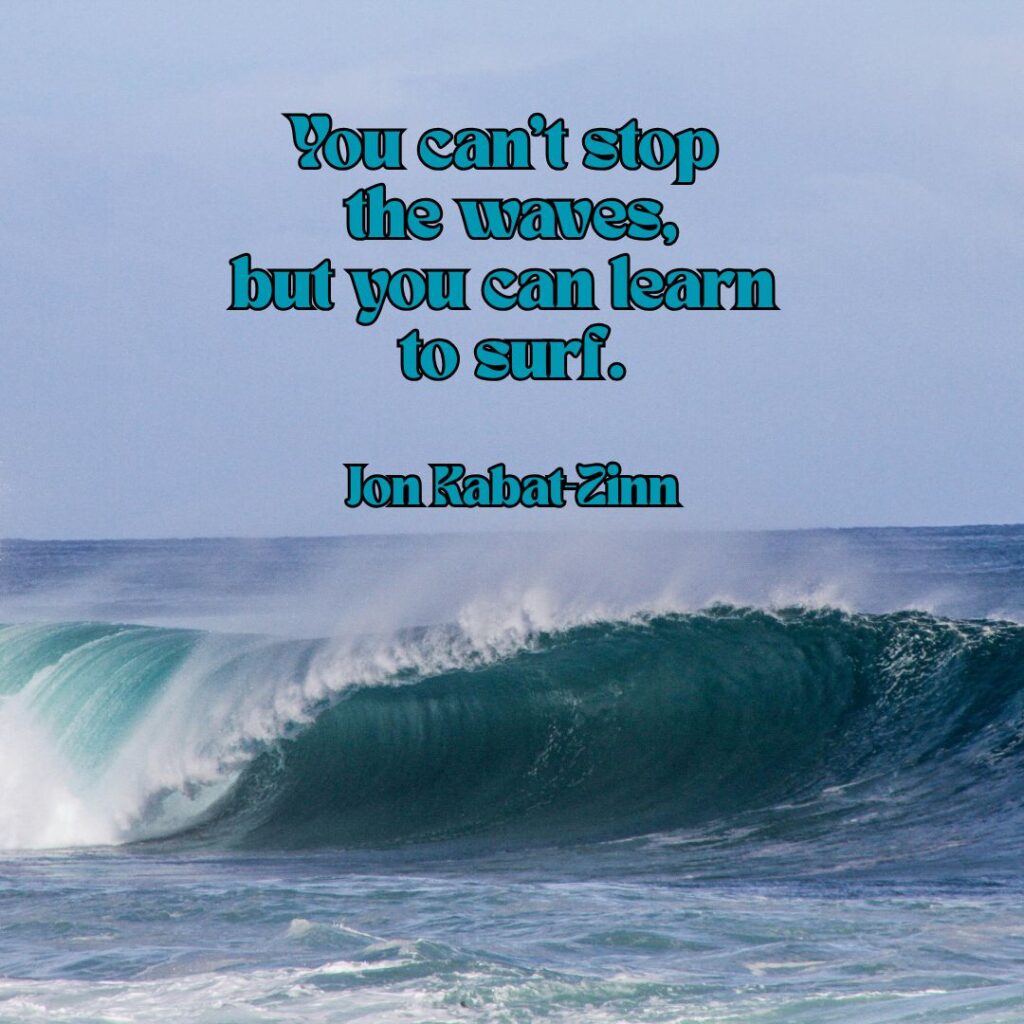“You can’t stop the waves, but you can learn to surf.” Jon Kabat-Zinn
Happy Monday!
I hope you had a wonderful weekend! As we say goodbye to October, let’s set the intention to move through the upcoming months with joy and awareness. There’s so much to accomplish in November and December, including enjoying the festivities while keeping our anxiety under control.
As I mentioned last week, I was traveling that weekend. It was such fun, but I left behind a mountain of preparations that I usually handle over the weekend for the upcoming work week. Naturally, I felt the anxiety that comes with, in my case, a lack of preparation and the feeling of being behind before I even start. I’m sure many of you can relate.
In truth, anxiety is an equal opportunity and troublesome emotion that can quickly spiral out of control if not managed. For some of us, it’s debilitating and can swiftly turn into a panic attack with a range of mental, emotional, and physical symptoms that leave us frightened and unwell.
Allow me to share some realities. Anxiety is, by definition, future-focused. It is the overwhelming concern about something that might happen and the feeling that we won’t be able to control the event, or that we won’t be able to manage our responses. When we give it more focus or attention than warranted, we may become actively triggered, which can result in a diminished ability to think logically, make appropriate choices, escape the situation, or spiral into a potentially dangerous series of physical or emotional responses.
In these situations, it’s often not the event itself that is the problem; it’s how we respond to it. The good news is that we can learn to control our thoughts and make choices that promote healthy attitudes and results. It’s about taking the time to change our automatic reactions, actively managing our thoughts, and adding tools to our mental toolkit specifically for preventing and handling anxiety.
I really like this quote from one of the pioneers in mindfulness and stress reduction:

This idea from Dr. Kabat-Zinn reflects the ideal outcome of taking control of our responses to anxiety. It’s not as simple as it sounds (learning to surf isn’t either, for that matter); however, there is hope for a way to reduce the adverse effects caused by anxiety. With a little effort and good timing, we can regain control over our impulsive reactions. I’ll share some of my favorite tools that I hope will help when you start to feel your pulse quicken.
For me, the first line of defense is breathing. That’s right. When we become anxious, our bodies often go into fight-or-flight mode. It’s at that moment that we can pause and take a few cleansing breaths to regroup momentarily. Here are a couple of options. The first is to practice box breathing. This exercise involves a repetitive cycle in four steps: you breathe in for a count of 4, hold for a count of 4, breathe out for a count of 4, and hold for a count of 4, then repeat the process until you feel calmer. The second option is to breathe in for a count of 6, hold for a count of 3, and then breathe out for a count of 7. There’s something magical about really pushing that last breath out for a longer count that provides great relief.
The next line of defense is mindfulness. Mindfulness can include breathing exercises you can do anywhere. My personal favorite is mindful walking, and I add a bit of EMDR (Eye Movement Desensitization and Reprocessing – more about this in future Musings) to the practice. It’s pretty simple. As you take a walk outside, decide to notice something specific. For example, you might look for every red flower you see (it could be a particular type or color of door, a certain kind of animal, or anything you can imagine). Then, as you walk, look left for a red flower, right for a red flower, and continue this pattern for the duration of your walk.
The results are pretty amazing. When we do breathwork or practice mindfulness, we relax our minds, regain our composure, and let creative ideas flow more easily. We can do this because we loosen the tightness that anxiety creates.
You won’t be surprised that my primary anti-anxiety method is prayer. Prayer helps me to refocus on what’s essential while asking for Divine guidance. After all, His ways are not my ways (Isaiah 55:8), as Scripture reminds.
And some additional Scripture references:
“Be anxious for nothing, but in everything by prayer and supplication, with thanksgiving, let your requests be made known to God; 7 and the peace of God, which surpasses all understanding, will guard your hearts and minds through Christ Jesus.” Philippians 4:6-7 (NKJV)
“Humble yourselves, therefore, under God’s mighty hand, that he may lift you up in due time. Cast all your anxiety on him because he cares for you. Be alert and of sober mind. Your enemy, the devil, prowls around like a roaring lion looking for someone to devour.” 1 Peter 5:6-8 (NIV)
I know this Musing was a bit long, sorry about that! I wanted to give you some tools to navigate the upcoming holiday season. Whenever you feel the downward spiral of anxiety, take a few minutes to practice breathwork, mindfulness, and prayer. I’m confident it will help ease any tense situation.
I wish you peace and joy in your holiday journey. And remember, if it’s an especially tough season for you, please seek professional assistance. We’re here to support you!
Be Well & Be Blessed!
Lucinda
Comments by lucinda